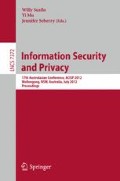Abstract
Timed-release cryptography addresses the problem of “sending messages into the future”: a message is encrypted so that it can only be decrypted after a certain amount of time, either (a) with the help of a trusted third party time server, or (b) after a party performs the required number of sequential operations. We generalise the latter case to what we call effort-release public key encryption (ER-PKE), where only the party holding the private key corresponding to the public key can decrypt, and only after performing a certain amount of computation which may or may not be parallelisable. Effort-release PKE generalises both the sequential-operation-based timed-release encryption of Rivest, Shamir, and Wagner, and also the encapsulated key escrow techniques of Bellare and Goldwasser. We give a generic construction for ER-PKE based on the use of moderately hard computational problems called puzzles. Our approach extends the KEM/DEM framework for public key encryption by introducing a difficulty notion for KEMs which results in effort-release PKE. When the puzzle used in our generic construction is non-parallelisable, we recover timed-release cryptography, with the addition that only the designated receiver (in the PKE setting) can decrypt.
Access this chapter
Tax calculation will be finalised at checkout
Purchases are for personal use only
Preview
Unable to display preview. Download preview PDF.
References
Bellare, M., Goldwasser, S.: Encapsulated key escrow. Technical Report 688, MIT Laboratory for Computer Science (April 1996), http://cseweb.ucsd.edu/~mihir/papers/escrow.html
Bellare, M., Goldwasser, S.: Verifiable partial key escrow. In: Graveman, R., Janson, P.A., Neumann, C., Gong, L. (eds.) ACM CCS, pp. 78–91. ACM (1997)
Bellare, M., Rogaway, P.: The Security of Triple Encryption and a Framework for Code-Based Game-Playing Proofs. In: Vaudenay, S. (ed.) EUROCRYPT 2006. LNCS, vol. 4004, pp. 409–426. Springer, Heidelberg (2006)
Chalkias, K., Hristu-Varsakelis, D., Stephanides, G.: Improved Anonymous Timed-Release Encryption. In: Biskup, J., López, J. (eds.) ESORICS 2007. LNCS, vol. 4734, pp. 311–326. Springer, Heidelberg (2007)
Chen, L., Morrissey, P., Smart, N.P., Warinschi, B.: Security Notions and Generic Constructions for Client Puzzles. In: Matsui, M. (ed.) ASIACRYPT 2009. LNCS, vol. 5912, pp. 505–523. Springer, Heidelberg (2009)
Cheon, J.H., Hopper, N., Kim, Y., Osipkov, I.: Provably secure timed-release public key encryption. ACM Trans. Inf. Syst. Secur. 11, 4:1–4:44 (2008)
Chow, S.S.M., Yiu, S.M.: Timed-Release Encryption Revisited. In: Baek, J., Bao, F., Chen, K., Lai, X. (eds.) ProvSec 2008. LNCS, vol. 5324, pp. 38–51. Springer, Heidelberg (2008)
Cramer, R., Shoup, V.: Design and analysis of practical public-key encryption schemes secure against adaptive chosen ciphertext attack. SIAM Journal on Computing 33(1), 167–226 (2003)
Dwork, C., Naor, M.: Pricing via Processing or Combatting Junk Mail. In: Brickell, E.F. (ed.) CRYPTO 1992. LNCS, vol. 740, pp. 139–147. Springer, Heidelberg (1993)
Juels, A., Brainard, J.: Client puzzles: A cryptographic countermeasure against connection depletion attacks. In: Proc. Network and Distributed System Security Symposium (NDSS) 1999, pp. 151–165. Internet Society (1999)
Okamoto, T., Pointcheval, D.: REACT: Rapid Enhanced-Security Asymmetric Cryptosystem Transform. In: Naccache, D. (ed.) CT-RSA 2001. LNCS, vol. 2020, pp. 159–175. Springer, Heidelberg (2001)
Rangasamy, J., Stebila, D., Boyd, C., Gonzalez Nieto, J.: An integrated approach to cryptographic mitigation of denial-of-service attacks. In: Sandhu, R., Wong, D.S. (eds.) Proc. 6th ACM Symposium on Information, Computer and Communications Security (ASIACCS) 2011, pp. 114–123. ACM (2011), http://eprints.qut.edu.au/41285/
Rangasamy, J., Stebila, D., Boyd, C., Gonzalez Nieto, J., Kuppusamy, L.: Efficient modular exponentiation-based puzzles for denial-of-service protection. In: Proc. International Conference on Information Security and Cryptology (ICISC 2011). LNCS, Springer, Heidelberg (2011) (to appear), http://eprints.qut.edu.au/47894/
Rivest, R.L., Shamir, A., Wagner, D.A.: Time-lock puzzles and timed-release crypto. Technical Report TR-684, MIT Laboratory for Computer Science (March 1996), http://people.csail.mit.edu/rivest/RivestShamirWagner-timelock.pdf
Shoup, V.: A proposal for an ISO standard for public key encryption (version 2.1). manuscript (2001), http://shoup.net/papers
Shoup, V.: Sequences of games: a tool for taming complexity in security proofs. Technical report (2004), http://eprint.iacr.org/2004/332
Stebila, D., Kuppusamy, L., Rangasamy, J., Boyd, C., Gonzalez Nieto, J.: Stronger Difficulty Notions for Client Puzzles and Denial-of-Service-Resistant Protocols. In: Kiayias, A. (ed.) CT-RSA 2011. LNCS, vol. 6558, pp. 284–301. Springer, Heidelberg (2011), http://eprints.qut.edu.au/40036/
Author information
Authors and Affiliations
Editor information
Editors and Affiliations
Rights and permissions
Copyright information
© 2012 Springer-Verlag Berlin Heidelberg
About this paper
Cite this paper
Rangasamy, J., Stebila, D., Boyd, C., González-Nieto, J.M., Kuppusamy, L. (2012). Effort-Release Public-Key Encryption from Cryptographic Puzzles. In: Susilo, W., Mu, Y., Seberry, J. (eds) Information Security and Privacy. ACISP 2012. Lecture Notes in Computer Science, vol 7372. Springer, Berlin, Heidelberg. https://doi.org/10.1007/978-3-642-31448-3_15
Download citation
DOI: https://doi.org/10.1007/978-3-642-31448-3_15
Publisher Name: Springer, Berlin, Heidelberg
Print ISBN: 978-3-642-31447-6
Online ISBN: 978-3-642-31448-3
eBook Packages: Computer ScienceComputer Science (R0)

